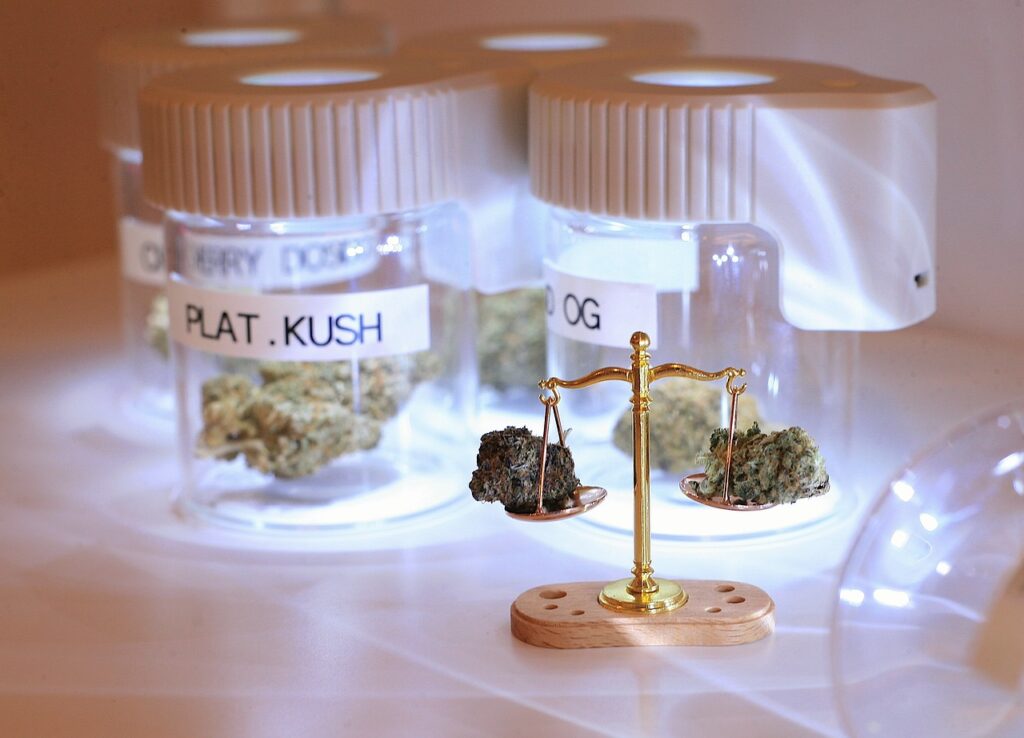THC and CBD

When exploring THC and CBD, you should know THC is the compound in cannabis that gets you high, while CBD is known for its therapeutic benefits without the psychoactive effects. THC interacts with your brain’s CB1 receptors and provides euphoria and relaxation, whereas CBD engages CB2 receptors to help with pain and inflammation. THC can cause side effects like paranoia or memory issues, but CBD is generally well-tolerated. Combining them can enhance and balance their effects, creating a smoother experience. Understanding these interactions lets you make better choices about cannabis use if you look deeper into this topic.
What is THC and CBD?
THC, or tetrahydrocannabinol, and CBD, or cannabidiol, are two of the most well-known compounds found in the cannabis plant. You’ve probably heard about them, but what exactly are they?
THC is the primary psychoactive compound in cannabis; it’s the one that gives you that ‘high’ feeling. When you consume THC, it interacts with your brain’s receptors, specifically the CB1 receptors, producing various effects like euphoria, relaxation, and altered senses.
On the other hand, CBD doesn’t get you high. Instead, it’s known for its potential therapeutic benefits. It interacts with different receptors in your body, mainly the CB2 receptors, which are part of your immune system. Many people use CBD for its potential to help with pain, inflammation, anxiety, and other health issues without the psychoactive effects of THC.
Both THC and CBD are cannabinoids, a type of compound that interacts with the endocannabinoid system in your body. This system plays a crucial role in maintaining various physiological processes like mood, appetite, and sleep.
Differences Between THC and CBD
While both THC and CBD come from the same plant, they have distinct differences that set them apart in terms of effects and uses.
THC, known for its psychoactive properties, is the compound that gives you the ‘high’ feeling associated with marijuana. It binds to CB1 receptors in your brain, leading to altered sensory perceptions, euphoria, and increased appetite.
CBD, on the other hand, doesn’t get you high. It interacts mainly with CB2 receptors found throughout your body. This interaction can help reduce inflammation and alleviate pain. Many people use CBD for its calming effects, making it popular for anxiety relief and sleep support.
Legally, THC and CBD are treated differently. THC is still classified as a controlled substance in many places, whereas CBD is often legal, especially when derived from hemp. This makes CBD more accessible for those seeking its therapeutic benefits without the legal risks.
In terms of side effects, THC can cause paranoia, memory impairment, and increased heart rate. CBD is generally well-tolerated, but some users might experience dry mouth, fatigue, or changes in appetite.
Knowing these differences can help you make an informed decision about which compound suits your needs best.
Combining THC and CBD: The Entourage Effects
Have you ever wondered how THC and CBD work together to enhance each other’s effects? This phenomenon is known as the entourage effect. When THC and CBD are combined, they interact synergistically, leading to more balanced and potent outcomes than when they’re used separately.
THC, known for its psychoactive properties, binds primarily to CB1 receptors in the brain, producing euphoria and relaxation. CBD, on the other hand, doesn’t bind directly to these receptors. Instead, it modulates their activity and can counteract some of THC’s less desirable effects, like anxiety and paranoia.
By combining THC and CBD, you can experience enhanced therapeutic benefits. For instance, CBD can prolong the duration of THC’s effects and mitigate its intensity, making the overall experience smoother. This balance is particularly beneficial for medical users seeking relief from conditions like chronic pain, anxiety, or inflammation without extreme psychoactive effects.
The entourage effect underscores the importance of the cannabis plant’s full spectrum of compounds, not just THC or CBD in isolation. So, when you consider using cannabis for health or recreational purposes, remember that combining these cannabinoids can offer a more effective and enjoyable experience.
Potential Risks and Side Effects of THC and CBD
Despite the benefits of combining THC and CBD, it’s important to be aware of the potential risks and side effects associated with their use. THC, the psychoactive component, can cause dizziness, dry mouth, and anxiety. You might even experience paranoia or impaired memory if you consume high doses. It’s crucial to start with a low dose and gradually increase it to monitor how your body reacts.
CBD, while generally considered safe, can still cause side effects. You could experience fatigue, diarrhea, and changes in appetite or weight. If you’re taking other medications, CBD might interact with them, potentially reducing their effectiveness or causing adverse reactions. Always consult your healthcare provider before adding CBD to your regimen.
Both THC and CBD can have long-term effects, particularly with chronic use. THC may impact cognitive function and mental health, while long-term CBD use may lead to liver damage in rare cases. It’s vital to use these compounds responsibly and remain informed about their potential impacts on your health.
Understanding these risks enables you to make informed decisions about incorporating THC and CBD into your wellness routine, ensuring you reap the benefits while minimizing potential downsides.
marijuana doctors
marijuana doctor
MARIJUANA DOCTOR
MARIJUANA DOCTOR
marijuana doctor
medical marijuana
medical cannabis
medical marijuana doctor
medical marijuana doctor
medical marijuana doctor
medical marijuana doctor
medical marijuana doctor
medical marijuana card
medical marijuana card
medical marijuana card
medical marijuana card
medical marijuana card
medical marijuana patients
texas medical marijuana
texas medical marijuana
texas medical marijuana
texas medical marijuana
texas medical marijuana
texas medical marijuana
compassionate use registry
medical marijuana dispensaries
medical marijuana dispensaries
medical marijuana journey
medical marijuana journey
texas department
texas department
texas department
post traumatic stress disorder
post traumatic stress disorder
post traumatic stress disorder
qualifying medical conditions
qualifying medical conditions
qualifying medical conditions
qualifying medical conditions
qualifying medical conditions
low thc cannabis
low thc cannabis
low thc cannabis
low thc cannabis
low thc cannabis
medical conditions
medical conditions
multiple sclerosis
multiple sclerosis
multiple sclerosis
multiple sclerosis
multiple sclerosis
san antonio
san antonio
san antonio
san antonio
san antonio
alleviate symptoms
public safety
incurable neurodegenerative disease
incurable neurodegenerative disease
incurable neurodegenerative disease
compassionate use act
compassionate use act
compassionate use act
metric and imperial units
metric and imperial units
metric and imperial units
initial consultation
initial consultation
initial consultation
dallas tx
dallas tx
dallas tx
dallas tx
dallas tx
intractable epilepsy
intractable epilepsy
intractable epilepsy
amyotrophic lateral sclerosis
amyotrophic lateral sclerosis
amyotrophic lateral sclerosis
potential benefits
medical marijuana doctors
A marijuana doctor specializes in assessing patients to determine if they qualify for medical cannabis use. These professionals provide recommendations and guidance on how to use cannabis for therapeutic purposes ensuring patients receive the appropriate treatment for their conditions. Their expertise helps patients navigate the complexities of medical cannabis laws and usage.
medical marijuana doctors
medical marijuana doctors
medical marijuana doctors
medical marijuana doctors
well being
low thc
low thc
physician
physician
physician
physician
physician
texas
texas
texas
texas
texas
marijuana doctors
marijuana doctors
marijuana doctors
marijuana doctors
marijuana doctors
doctor
doctor
doctor
doctor
doctor
prescription
prescription
prescription
prescription
prescription
access
access
access
access
access
qualify
qualify
qualify
qualify
qualify
specific needs
specific needs
specific needs
specific needs
specific needs
cannabis
cannabis
cannabis
cannabis
cannabis
dallas
dallas
dallas
dallas
dallas
treatment
treatment
treatment
treatment
treatment
patient
patient
patient
patient
patient
pay
pay
pay
pay
pay
education
education
education
education
education
benefits
benefits
benefits
benefits
benefits
marijuana
marijuana
marijuana
marijuana
marijuana
request
request
request
request
request
medicine
medicine
medicine
medicine
medicine
evaluation
evaluation
evaluation
evaluation
evaluation
telemedicine
telemedicine
telemedicine
telemedicine
telemedicine
consult
schedule
schedule
schedule
schedule
schedule
medications
medications
approved
doctors
doctors
doctors
doctors
doctors
cancer
cancer
cancer
cost
cost
cost
cost
cost
home jump left
home jump left
home jump left
dallas texas
legal
legal
legal
visit
visit
visit
visit
visit
city
city
ailments
person
person
person
person
person
benefit
concerns
concerns
